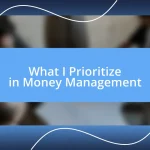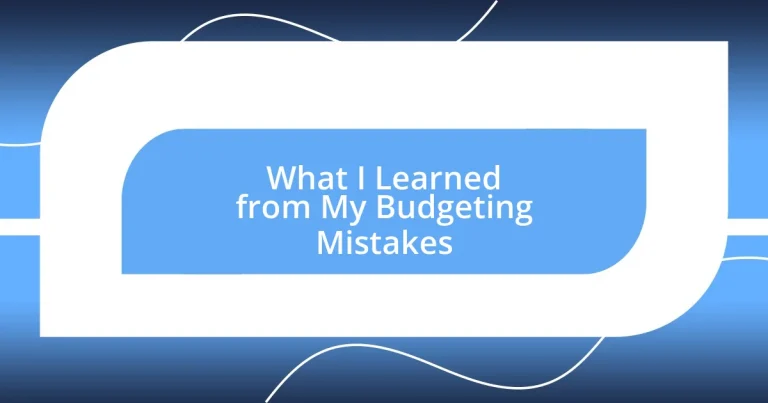Key takeaways:
- Underestimating expenses and neglecting irregular costs can severely disrupt a budget and lead to financial stress.
- Setting realistic financial goals and tracking daily spending are essential for maintaining control and awareness over personal finances.
- Regularly reviewing budgets and cultivating a positive mindset are crucial for long-term financial health and resilience against past mistakes.
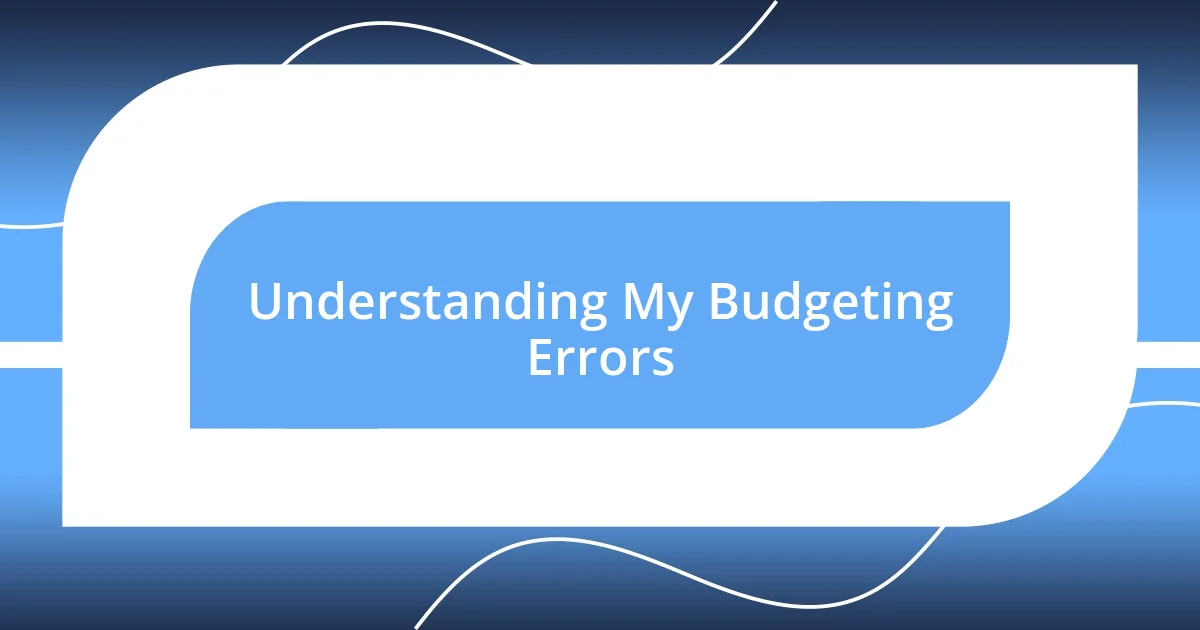
Understanding My Budgeting Errors
When I first started budgeting, I made the critical error of underestimating my expenses. I remember one month vividly: I anticipated my grocery bill would be around $200, but reality hit hard at nearly $350. How often do we approach budgets with optimism, only to be blindsided by unexpected costs?
Another mistake I often made was neglecting to account for irregular expenses. For instance, a surprise car repair one autumn threw my entire budget out of whack. It taught me that budgeting is not just about the regular monthly costs but also about forecasting those occasional, inevitable expenses.
Finally, I realized I had a tendency to dismiss the emotional aspect of spending. I would often justify impulsive purchases as a “treat” to myself after a long week. This led to an ongoing cycle of guilt and shame. It makes me wonder, have I really learned to celebrate wins without derailing my budget? It’s a question I still reflect on.
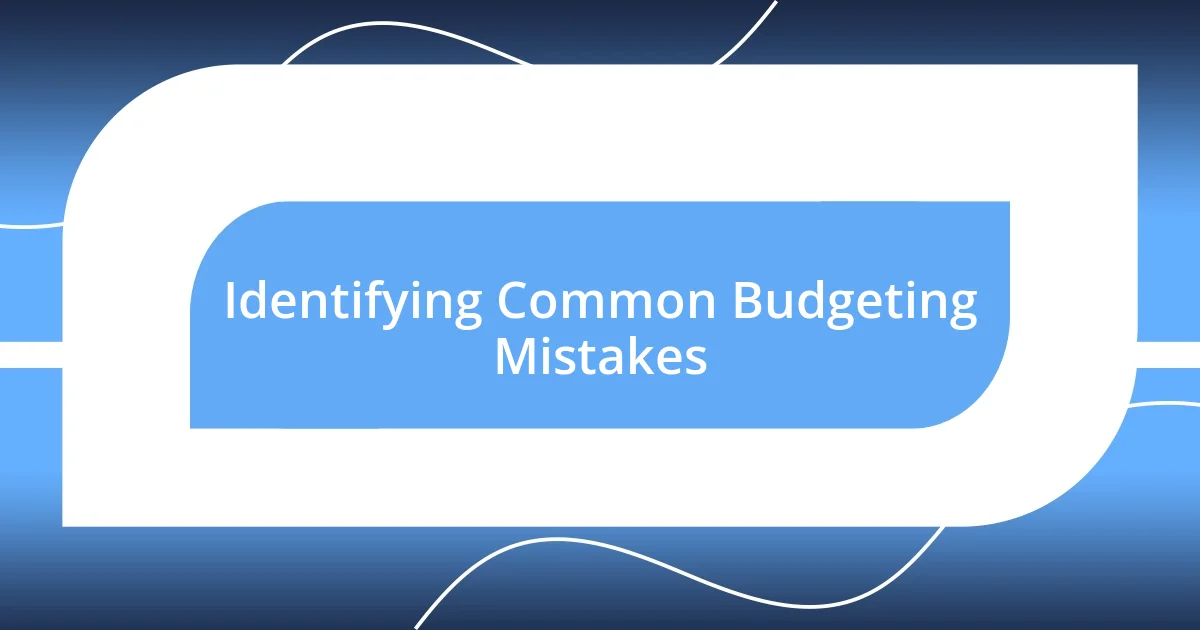
Identifying Common Budgeting Mistakes
Recognizing common budgeting mistakes is crucial to improving financial habits. One of the biggest pitfalls I encountered was failing to set specific financial goals. Initially, I would just say, “I want to save money,” but without a target in mind, I found myself aimlessly putting aside funds. This lack of direction often made it easy to dip into savings for unplanned purchases.
Here are some common mistakes I’ve identified in my journey:
- Underestimating Regular Expenses: Like when I thought my electricity bill would stay the same each month, but seasonal changes boosted it unexpectedly.
- Ignoring Variable Income: At one point, I relied on sporadic freelance work without acknowledging that some months would bring in significantly less.
- Overlooking Small Purchases: I dismissed tiny expenses as inconsequential, not realizing how they added up to a substantial amount by month-end.
In addition to these, I also learned the hard way about the importance of tracking my spending. I didn’t keep a close eye on daily expenses, thinking I could remember everything. Eventually, I was shocked to find that my daily coffee runs had become a silent budget killer. Engaging with my spending habits transformed my approach—making me realize that awareness is half the battle.
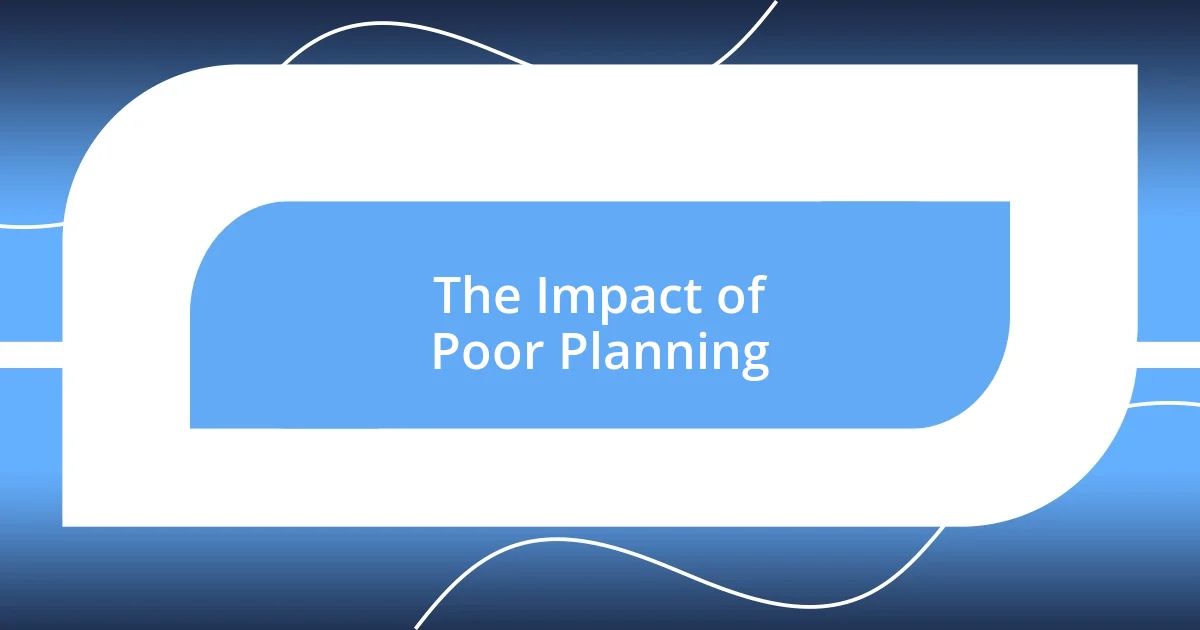
The Impact of Poor Planning
Poor planning in budgeting can lead to significant financial stress. I recall a time when I decided to allocate a certain amount for entertainment, believing that I would stick within it. I didn’t factor in my friend’s birthday celebration or that spontaneous dinner out. By the end of the month, I felt the crunch—not having enough for essential bills because I ignored the unpredictability of social obligations. Have you ever found yourself in a similar situation where social or unexpected costs derailed your financial plans?
The ramifications of poor planning extend beyond just numbers. I once faced a sinking feeling when reviewing my bank statements, seeing numerous small overdraft fees pile up from an overdrawn account. I realized these fees were a painful reminder that every little misstep or lack of foresight compounded into bigger issues. It’s as if those tiny oversights formed a tidal wave that crashed over my finances, leading to stress and regret. How do we learn to manage these tiny details that seem trivial at the moment?
Ultimately, poor planning affects your long-term goals. When I didn’t prioritize savings early on, I found myself scrambling to cover emergencies, leaving me with little room to reach my future financial dreams. It taught me that without a solid foundation and future-focused mindset, the journey toward financial stability becomes much harder. Setting aside a little for the future can mitigate those last-minute scrambles and provide security, and I now view my budget as a roadmap to a healthier financial future.
| Impact of Poor Planning | Personal Experience |
|---|---|
| Financial Stress | Underestimated social expenses led to budgeting chaos. |
| Compounded Issues | Overdraft fees emphasized the importance of detail. |
| Long-Term Consequences | Neglecting savings impacted future financial goals. |
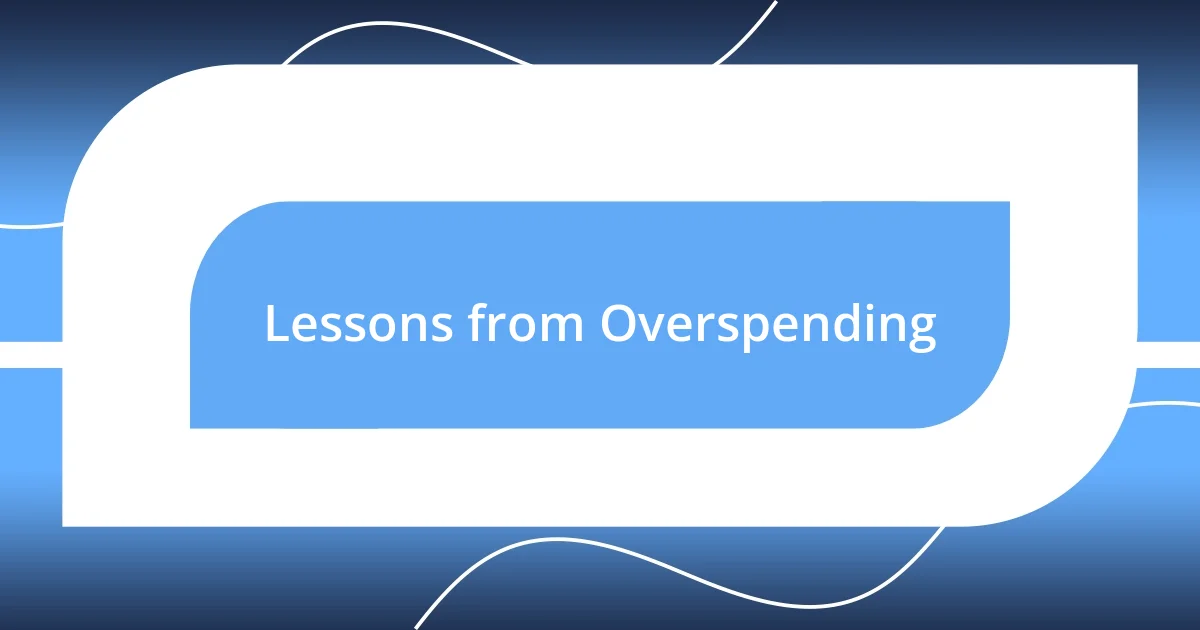
Lessons from Overspending
Overspending can often feel like a slippery slope. I remember when I bought an expensive gadget that I thought would boost my productivity, but it turned out to be a costly distraction. Reflecting on that, I realized how fleeting the satisfaction from such purchases can be. Instead of enhancing my life, it drained my finances and left me wondering why I hadn’t invested that money elsewhere.
One critical lesson I walked away with from my overspending experiences is the importance of impulse control. There was that time I treated myself to lavish meals during a spontaneous weekend getaway, thinking I deserved a break from my chores. The rush of indulging was intoxicating, but looking back, I realize it wasn’t worth sacrificing my budget for a moment’s enjoyment. Have you ever felt tempted to splurge on something that felt right in the moment but wrong later on?
Ultimately, each overspending episode taught me to prioritize my needs over wants. A memorable moment was standing in a store, brushing my fingers over items I didn’t really need while contemplating what I could have done with that money—perhaps an emergency fund buffer or a future trip. Those fleeting moments of desire quickly faded but left me with lasting regrets. Learning to resist such temptations has been my greatest ally in steering my financial ship toward calmer waters.
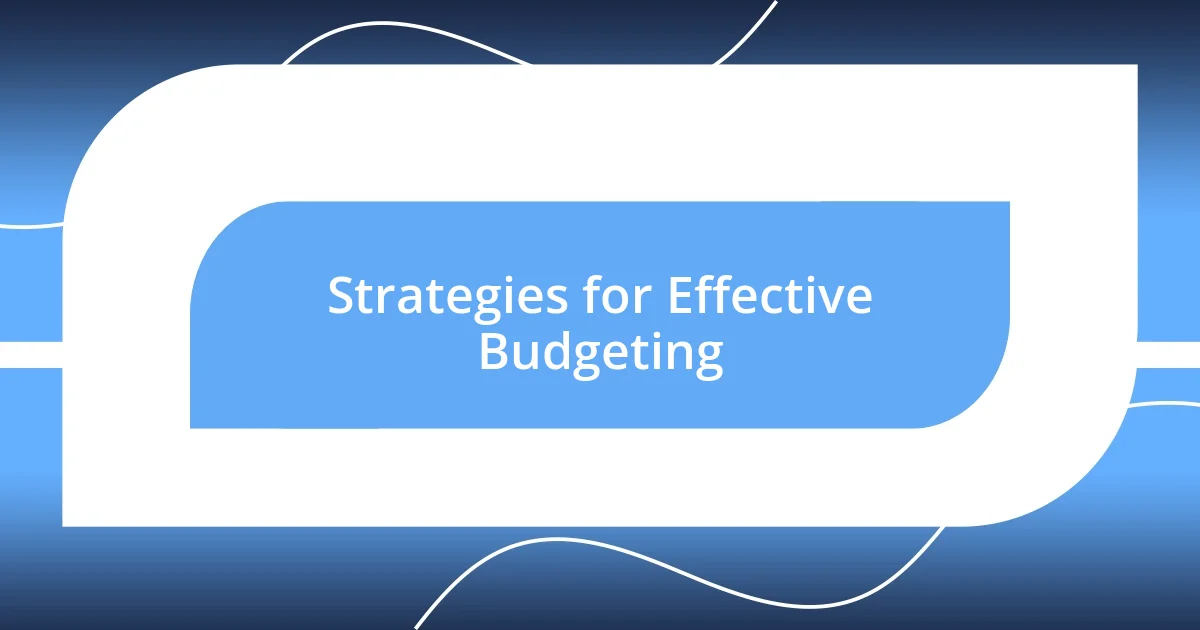
Strategies for Effective Budgeting
When I began my budgeting journey, I quickly discovered that setting realistic goals was crucial. One month, I boldly decided to cut my grocery bill by 50%, thinking I could rely on pantry staples. However, by week three, the challenge turned into a frantic scavenger hunt for anything edible, leaving me frustrated and hungry. Have you ever set a lofty goal only to find it completely unattainable? I learned that aligning my budgeting goals with my actual spending habits made all the difference.
Establishing a tracking system for my expenses transformed the way I viewed my finances. I started using an app to log every purchase, and what an eye-opener that was! I found my daily coffee runs were adding up to quite a significant amount by the end of the month. Suddenly, I began to evaluate my spending choices more critically. It’s fascinating how putting a number to your habits can create a moment of clarity. Have you tried a similar strategy? It could help reveal surprising patterns.
I also found that building in a buffer for unexpected expenses smoothed out the bumps in my budget. For example, I used to dread car repairs, always catching me off-guard financially. Now, I set aside a small “emergency fund” each month just for those unforeseen costs. This approach not only alleviated my anxiety but also fostered a sense of security. What if money wasn’t a constant source of stress? Trust me, preparing for the unexpected can change your financial outlook significantly.
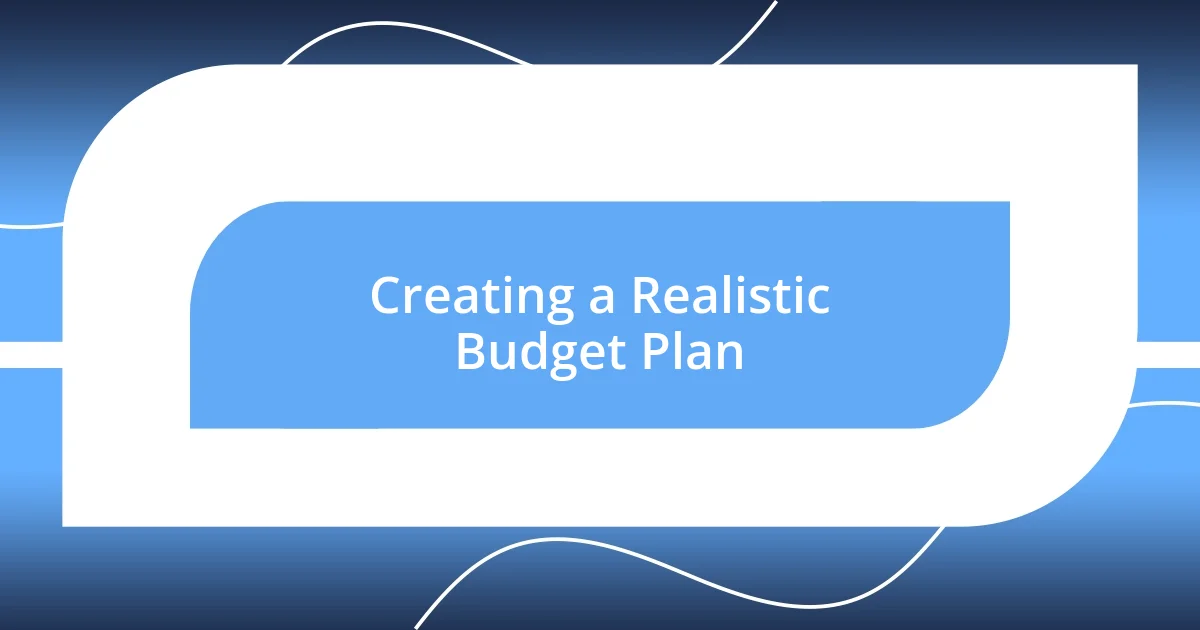
Creating a Realistic Budget Plan
Creating a realistic budget plan starts with an honest assessment of your current financial situation. I remember sitting down one weekend, coffee in hand, and scribbling every income source and expense I could think of on a whiteboard. That exercise was brutally eye-opening—I had been ignoring certain subscriptions that were quietly siphoning money from my account each month. Have you ever felt overwhelmed by the sheer number of automatic payments sneaking by unnoticed?
Once I had a clear picture, I learned to categorize my expenses into needs and wants. For instance, I used to lump all my dining expenses together, blissfully unaware of how many takeout meals I really indulged in. Separating these helped me recognize patterns and pinpoint areas where I could scale back. Have you tried categorizing your expenses? You might just uncover a few surprising habits you didn’t realize were dragging you down financially.
The key takeaway for me was embracing flexibility within my budget. I used to rigidly stick to numbers without considering the occasional need for a change—like a spontaneous dinner with friends. Now, I leave a little wiggle room in my budget for unexpected outings or new opportunities. When I integrate slight adjustments into my plan, it not only feels less restrictive but also more achievable. How liberating would it feel to enjoy life while staying on track with your finances? I’ve found that balance makes all the difference.
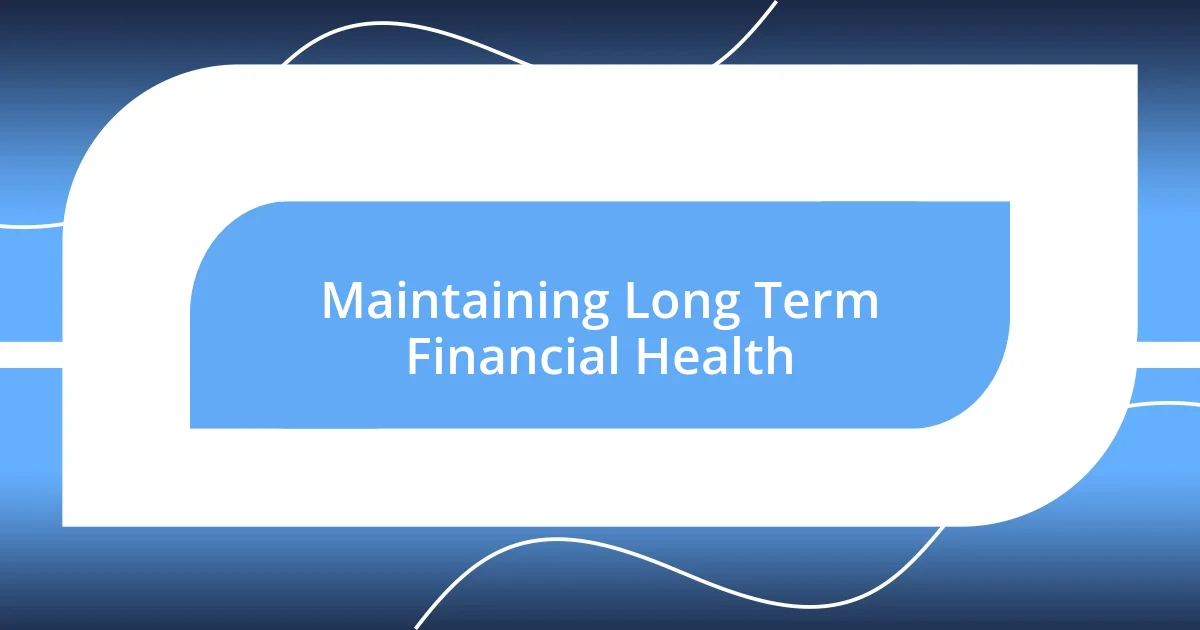
Maintaining Long Term Financial Health
Maintaining long-term financial health requires a proactive mindset. I vividly recall a time when I encountered a financial hiccup due to neglecting my savings. I thought just paying off my bills each month was enough, but I realized I wasn’t preparing for larger life events like emergencies or retirement. Have you ever brushed off the importance of saving, only to feel that sting later? That shift in perspective was eye-opening; I understood that having a solid savings plan is not just a cushion—it’s a lifeline.
Budgeting isn’t a one-time event; it’s an ongoing process. I learned that I needed to regularly revisit my financial goals and reassess my situation. Initially, I found it tedious to review my budget every month, but I soon discovered it led to incredible insights about my changing needs and circumstances. How often do you pause to reflect on your financial status? I now schedule a regular “money date”—a dedicated time to analyze my budget and celebrate my wins, however small. This habit not only keeps me accountable but also motivates me to stay on my path.
Lastly, cultivating the right mindset around money is crucial for sustainable financial health. There were moments when I felt defeated by my past budgeting mistakes, but instead of lingering in negativity, I chose to view these experiences as learning opportunities. I would ask myself, “What can I take away from this?” This shift in thinking has empowered me to take control of my financial future rather than letting past errors haunt me. Have you allowed setbacks to define your financial journey? Embracing a growth mindset can transform your relationship with money and foster ongoing financial wellness.




